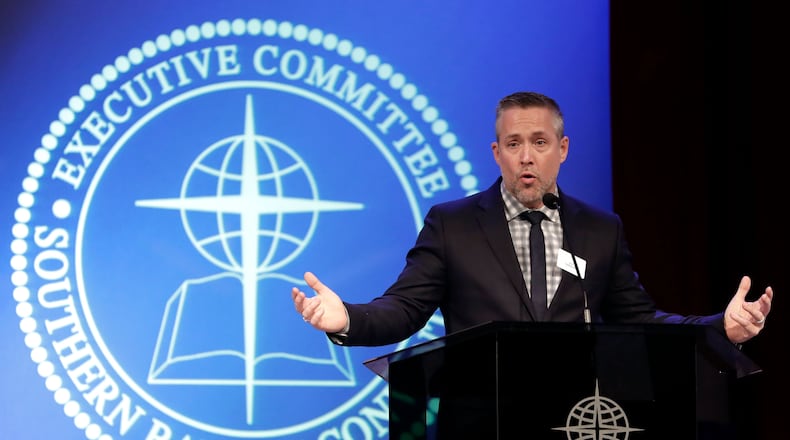Two Georgia churches, including one in Marietta, have been singled out by Southern Baptist Convention President J.D. Greear over reports of sexual abuse and misconduct by volunteers, staffers or people in the ministry.
Most of the 10 churches named by Greear during the denomination’s Executive Committee meeting earlier this week in Nashville are in Texas, according to media reports. Greear, who could not be reached for comment, has asked for a review of standing for those churches.
The abuse was detailed in a stunning series of articles by the Houston Chronicle and the San Antonio Express-News that outlined decades of abuse by hundreds of people who worked or volunteered in SBC churches.
The Georgia churches are Eastside Baptist Church on Lower Roswell Road and Trinity Baptist Church in Ashburn.
When reached by telephone, a man who identified himself as the pastor at Trinity declined to comment.
The Rev. John Hull, lead pastor at Eastside, though, said he has not been contacted by the SBC.
Hull said in a phone interview he hadn’t been the lead pastor at Eastside Baptist for very long when he was contacted in 2016 by one of the associate pastors, then police, about the alleged sexual battery by Alexander Edwards, a volunteer intern with the youth ministry.
Edwards was arrested for allegedly sexually abusing an 11-year-old boy, whom he met at the church.
It wasn’t the first time Edwards came to the attention of the law. He also worked in the youth ministry at a Baptist church in Leesburg when he was arrested in 2013 for allegedly using the internet for child pornography and to have sex with a minor, according to the Houston Chronicle article.
“There’s just shock and sadness when a child is harmed,” said Hull, whose church also has a school. “Jesus was clear, you don’t harm children. … This was a very difficult thing.”
Hull said the victim and his family, whom he called “wonderful people. Brave, brave people,” no longer go to Eastside.
He said Edwards allegedly worked himself into the confidences of the boy’s family until “they began to trust him.” He said Edwards “slipped through the cracks” at a time when there was no lead pastor and was brought on by a staffer who made a “unilateral decision” without going through proper background checks. That person was dismissed not long after the discovery that the process was violated.
According to the Houston article, the Lee County case was still pending when Edwards started volunteering at Eastside. He was convicted of the 2016 charges, The charge in Lee County was dismissed, according to the Houston Chronicle.
Related: Archdiocese releases names of "credibly accused" abusers
Hull, while applauding the SBC’s efforts to address the issues, said he was never informed that his church was a target.
“We were just stunned and saddened,” he said. “No one notified us beforehand. We heard about it through the media.”
Since the situation with Edwards, Hull said the church has put into place a number of safeguards.
That includes the formation of a church safety and security committee, specialized training for staffers, volunteers and ministers, the presence of security guards and between 40 and 50 cameras around the church and school.
Related: Will the #MeToo movement grow into a movement?
When contractors and visitors come to the church, they are required to show their license, which is then put into a database for criminal background checks. They are given a sticker with their photo, name, date they are there and the time they enter the facility.
A few weeks ago, an employee with a contractor was flagged in the system. He had a history of “inappropriate behavior with a child.” That person was removed from the grounds and not allowed back.
The latest news about abuse in the Southern Baptist Convention churches is just part of a growing #churchtoo movement.
“Sexual abuse in the church and the cover-up has been going on for thousands of years,” said the Rev. Ashley Easter, a board member for Survivors Network of Those Abused by Priests, or SNAP, and who helped organize the “For Such a Time as This” rally outside the SBC’s annual meeting last summer in Dallas. “This is nothing new, but now more survivors are coming forward and I think the #MeToo movement has been helpful for that. Survivors and advocates are speaking out.”
She criticized the denomination for not doing something years ago about abuse until pushed to do so because of public pressure.
“Abuse is always painful, but abuse in the church destroys a sacred spiritual trust. It really affects the faith experience.”
It may also be more difficult for survivors to come forward. A church is often viewed as a sanctuary; a place where people can feel closer to God and where trust is placed in ministers and pastors.
A person may feel coming forward could affect their family, neighbors and fellow congregation members, who often refer to themselves as “family.”
On Thursday, more than 200 Roman Catholic leaders gathered at a historic summit in Rome to address clergy sexual abuse.
In his opening remarks, Pope Francis said the faithful around the world “are looking at us and expect from us not simple condemnations, but concrete and effective measures to put in place. We need to be concrete.”
Last year, the Archdiocese of Atlanta released the names of 15 priests, seminarians, and those under direct authority of a religious order “credibly” accused of sexual abuse of a minor.
About the Author
The Latest
Featured


